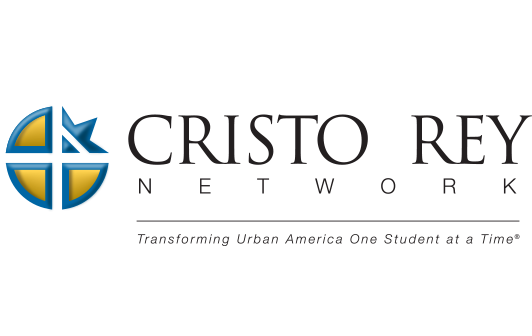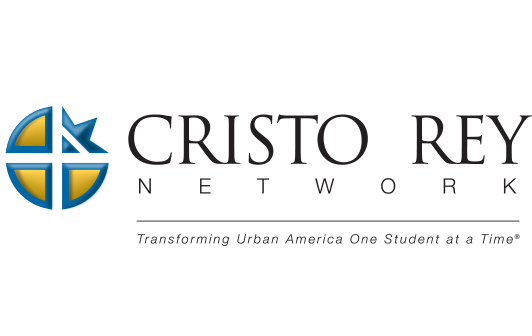
Cristo Rey Network
Cristo Rey prepares students for college and career with a pioneering work-study model
The Cristo Rey Network of private high schools uses an innovative Corporate Work Study model. Students from economically disadvantaged families attend classes four days a week, and spend the other day working jobs at nearby corporate partners—including Salesforce—earning a salary that covers the majority of their tuition (about $10,000 a year on average).
“The students get a college-prep education and get this great experience doing actual paying work with these fantastic companies,” says Mark Bazin, Chief Technology Officer for Cristo Rey Network, the national organization that oversees the Cristo Rey schools. “Students are graduating ready for college but also ready for life in the workforce.
“We find our students are more successful than their peers because of the experience they’ve had at Cristo Rey. Our corporate partners tell us our high school students are much more polished and ready for the world than most college graduates. It’s remarkable.”
Implementation of the Corporate Work Study Program means every school’s account managers must find job placements for as many as 570 students each year.
“For us, ‘selling’ is demonstrating the value proposition to a corporate partner so they want to hire a team of four students to job-share one role at about $30,000 per year,” Bazin says.
Achieving new process efficiencies
The Corporate Work Study Program presents unique challenges for member schools in tracking student workers. They must maintain records of where students are working, daily timecards and performance ratings submitted from job sites, and documents required for Department of Labor compliance.
For years, these records were maintained independently on various spreadsheets and emails.
“One school would do it one way and another school would do it another way,” Bazin says. “It was impossible to manage, and there was no ability for us (in the national office) to come up with any sort of standards, pull metrics, or do anything across all of these different processes.”
Nationally, the Cristo Rey Network needed to know and be able to report out on where the students were working. It couldn’t. Locally, that information could get murky, too. If an account manager left, his/her replacement didn’t necessarily have up-to-date partner relationship information.
Cristo Rey landed on a solution to those unique challenges: Salesforce.
“We used to live in Excel spreadsheets,” says Ana Chapa, Executive Director of Corporate Work Study at Don Bosco Cristo Rey in the Washington, D.C. area. “Going from that to Salesforce has been revolutionary.”
“We run into a lot of challenges managing lots and lots of data across lots and lots of situations, and that’s where Salesforce is really good for us,” Bazin says. “It gives us a good platform for all of the different things we do. It allows us to track the students in the workforce and create an institutional memory.”

Adds Chapa: “Once it’s in Salesforce, it’s in there forever. Using Salesforce for account management is really effective because it’s all in one place.
Salesforce has become our entire student database management system. We’re able to keep track of where students work, timesheets, where they’ve worked in the past, and to have direct dialogue with supervisors back and forth to get immediate feedback on how a student is doing. And have that all on mobile.”
Connecting autonomous schools on a single platform
When Bazin moved from Cristo Rey Jesuit in Houston to overseeing technology across the entire national network in 2015, he began by rolling out Salesforce to a handful of interested schools.
“It just felt like a natural fit for us,” he says.
He piloted use of Salesforce at five sites the following school year, copying what he and partner Pariveda Solutions had built in Houston. “The value of the ecosystem and the partners and how much expertise is out there has been a really big win for us,” he says. After learning some lessons about designing for long-term sustainability, Bazin and partner Appiphony developed a customized version that 18 schools used; the next year, that number rose to 23.
These schools now use Sales Cloud for process workflows and to track partner interactions for the Corporate Work Study Program, and to track students and alumni. And some schools are using the Nonprofit Success Pack for fundraising.
“Salesforce has, more than anything, made our communication more effective and transparent,” Chapa says.
Notes Bazin: “Salesforce has provided standardization among what we do at schools, Now every school using this platform has an identical rating system and identical timecards. The processes are identical. And we’re better able to match students with the best appropriate job.”

Scaling site support from headquarters
The national office now has visibility into each corporate partner and student placements. It analyzes this data and shares it with schools to inform their strategy in securing new corporate partners.
Bazin summarizes the benefits of Salesforce for an innovative, dispersed K-12 network: “Now we have processes and proven models that work for our day-to-day management of work study. From national, we can provide more value to our network.
“For schools, it’s providing a more robust way of managing a large amount of data and relationships that’s sustainable long-term.”
Cristo Rey uses an innovative school model of engaging students with both academics and real-world work experiences, using Salesforce to successfully manage student work study and corporate partnerships. Any school—private or public, for work study or extracurriculars—can similarly extend the flexible Salesforce platform to meet its unique needs in preparing students for college and career.
